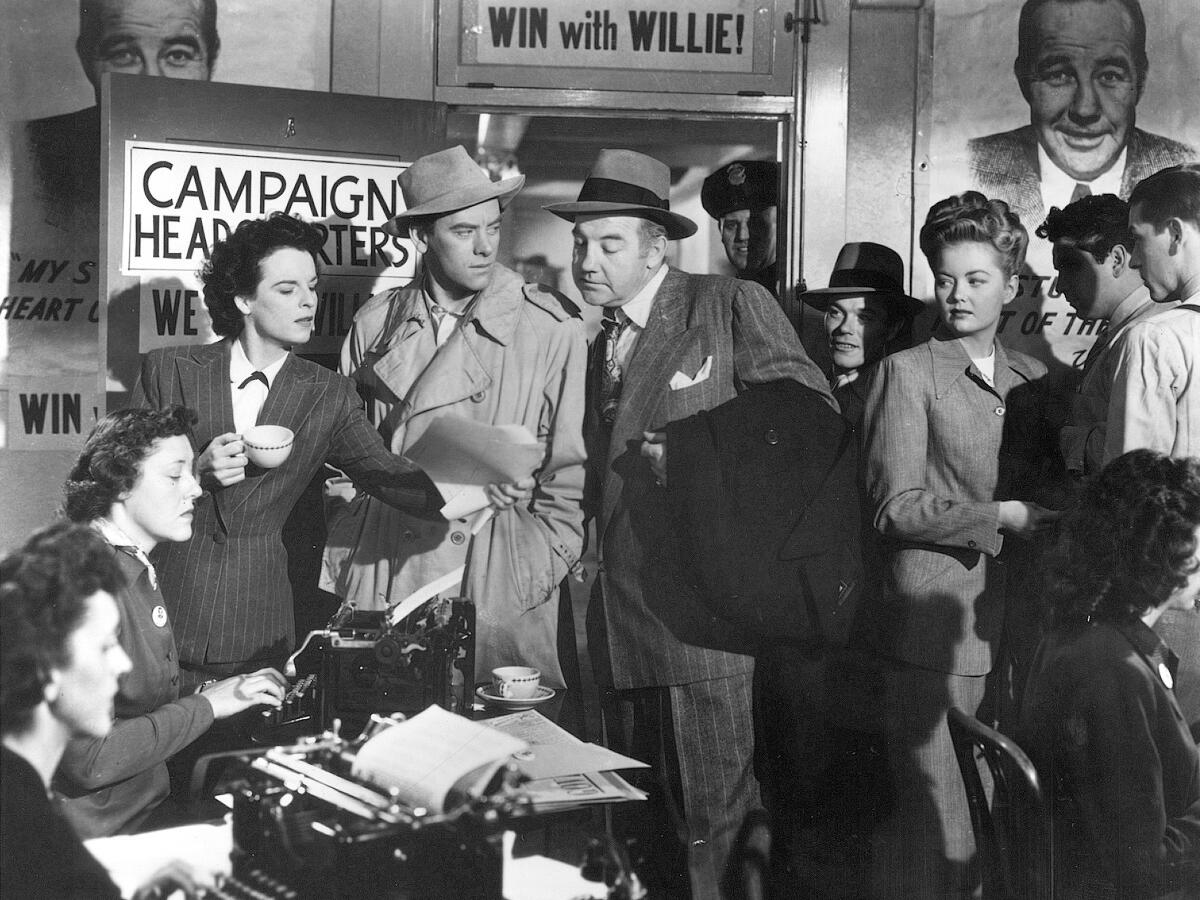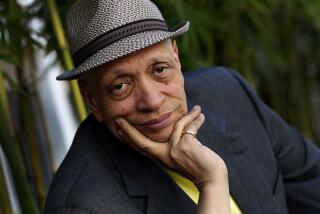From the Archives: ‘All the King’s Men’ shocker saga of man’s corruption

“All the King’s Men” is both great and terrible. It is a barrage of story power, effects and brilliant acting. Its audience will probably be legion because it is one of the most dynamic films of this or any other year.
A special premiere introduced the Robert Rossen production with terrific impact last night at RKO Pantages Hollywood Theater.
Rossen did the triple-threat job of writing and directing the film as well as producing for Columbia. He used the Pulitzer Prize novel “All the King’s Men” as the basis.
Ignores ‘names’
His starry galaxy puts no emphasis on well-known box-office “names.” His players were cast, quite evidently, for what they could deliver and most of them do deliver with a big punch.
Broderick Crawford bangs his way to super stardom with his performance. John Ireland and Mercedes McCambridge will be names to reckon with in the future. Shepperd Strudwick, Joanne Dru, John Derek and a half dozen others are spotlighted with meteoric suddenness. Hollywood itself will have to sit up and take notice about this picture all the way through.
The story is about a politician who becomes governor of a state. Those who may want to can identify him as they will.
Man and machine
But more than being a story of a man, “All the King’s Men” is the saga of a machine — the big human machine of politics seen in its worst light.
“Man is conceived in sin and born in corruption” is one of the main slogans of the protagonist of this picture, Willie Stark (Crawford). Stark personally proves his point, because his story is one of complete corruption. He uses corruption as the weapon to fight the corruption he encountered when he tried to make an honest career. He broke through the blockade to bribe and corrupt even the men who were already corrupt.
The picture shows him in full tilt and flight in the various stages of his mammoth venture of rule and tyranny, of good deeds done for the populace, who are his feverish supporters to the very end of his wretched schemings and cruelties, of his drunkenness and loose living and all else that went with his maintenance of his place as top duck.
Litany of evil
Jack Burden (Ireland) and Sadie Burke (Miss McCambridge) trail along with him. They watch his persuasions work to intrigue and ensnare the daughter of a judge (Miss Dru) once affianced to Burden. They see him hound the judge (Raymond Greenleaf) to his death by suicide. They witness him sending his own son (Derek), who had been involved in a drunk-driving accident, onto a football field to become a cripple for life.
Practically all of these things are done so Willie Stark may retain his prestige and his shiny, dazzling, nefarious place in the political sun.
The end is the anticipated one that frequently besets tyrants — the assassin’s bullet ’ and it is the cool, calm doctor (Strudwick), son of the suicided judge and brother of Miss Dru, who vengefully fires the shot that finishes Willie Stark. The machine guns of the police in turn rat-tat-tat him to the ground.
Stark dies a martyr in the mind of the mob. Those who have seen the man as he is will feel a kind of strange sentimental sympathy for him, because they will view him as one who had finer capacity but made himself the victim of vile circumstance, because it was the surest way to win.
Willie Stark’s story
“All the King’s Men” does not carry bitterness with it about a general problem. It is the story of a single individual. To what account it may be put by the subversive is another issue entirely.
Actually it has to be regarded as simply and violently the story of Willie Stark, and as such a drama of great psychological force — practically all wrong.
This is primarily a producer-director-writer’s picture, but the way that Crawford especially fell in line with its mood, as did all the other players, reflects enormous credit on them. Miss McCambridge, being new, will provoke much attention. Ireland is amazingly efficient.
“All the King’s Men” makes history because it is technically so fine, quite apart from its subject. It stands at the present moment to win a veritable assortment of Academy Awards. It might even sweep the board. What the public will find in it for compensation or otherwise will depend wholly on the individual viewpoint, but it is hardly one of the films that can be ignored. Hardly!
Helping the ensemble of portrayals in large degree are such players as Katharine Warren, briefly seen as Ireland’s mother; the silent (until the last moment) Walter Burke, as Sugar Boy; Anne Seymour, as Crawford’s wife; Grandon Rhodes, Ralph Dumke, Will Wright, H.C. Miller and various others.
Burnett Guffey photographed the film, and Louis Gruenberg supplied the unusual musical score.
More to Read
Only good movies
Get the Indie Focus newsletter, Mark Olsen's weekly guide to the world of cinema.
You may occasionally receive promotional content from the Los Angeles Times.










